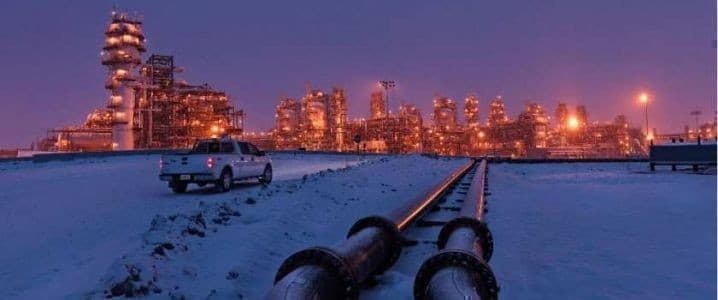Over the past decade, major oil companies, under pressure from investors and environmentalists, have been fleeing Canada's oil sands, the fourth-largest oil reserve in the world, while investment in existing projects has stalled. A lack of pipelines and heavy emissions have weighed on the Canadian heavy crude sector for years, with some companies exiting after coming under pressure to invest in projects with lower emissions. According to research firm Rystad Energy, oil sands production in Alberta generates ~160 pounds of carbon per barrel, the highest of any oilfield in the world.
But Alberta’s politicians have no plans to ditch the province’s main cash cow any time soon. Alberta premier Danielle Smith has declared that the energy-rich region will transition away from emissions, not oil.
"We're transitioning away from emissions, we're not transitioning away from oil and gas. We're not going to phase out production of oil and natural gas, we're just going to change the way in which we use it," Smith has said at the World Petroleum Congress in Calgary, Alberta. According to her, hydrogen from natural gas will likely become an increasingly important fuel in the province while carbon capture, utilization and storage (CCUS) will play a role in cleaning up emissions. Smith has differed radically with Canada's minister of energy and natural resources Jonathan Wilkinson who the previous day had supported IEA’s prediction that world oil demand will fall to just 25 million barrels per day by 2050, or a quarter of current global demand, an assertion Smith has dismissed as ‘ludicrous’. Wilkinson had argued that oil and gas after 2050 would primarily be used in applications not requiring combustion, such as petrochemicals, lubricants, solvents, carbon graphite, asphalt and waxes.
Alberta To Unveil Carbon Capture Incentive Program
On Tuesday, Alberta’s energy minister Brian Jean announced that his office is finalizing an investment incentive program for emissions-cutting technologies like carbon capture and storage to be unveiled in the "coming months". Canada considers CCUS a key tool in helping the country’s high-polluting oil and gas industry slash emissions without cutting back on production. However, Canadian companies have been holding back on final investment decisions mainly because of the high costs associated with carbon capture and have been lobbying for more government support. Related: California Truckers Race To Buy Diesel Rigs Ahead Of New Zero-Emission Rule
An Alberta incentive program, working alongside a federal government investment tax credit first announced last year, would be pivotal in jumpstarting Canada\s nascent CCUS sector.
"We're going to make sure we do a robust consultation to get it right. If we get it right, that means that we're going to see another economic boom here in Alberta," Jean told Reuters in an interview.
Canada has set a net-zero emissions by 2050. A number of companies including Enbridge Inc.(NYSE:ENB), TC Energy Corp. (NYSE:TRP) as well as a coalition of Canada's six largest oil sands producers called Pathways Alliance have proposed building major CCS storage hubs.
But their American peers are considerably ahead of them.
Back in February, oil field services giant Schlumberger Ltd (NYSE:SLB) SLB discussed its newly carved SLB New Energy unit with Bloomberg New Energy Finance (BNEF). The segment will invest in hydrogen, carbon solutions, energy storage, geothermal and geo-energy and critical minerals. According to SLB New Energy president Gavin Rennick, the new unit has the potential to hit revenue of $3 billion by the end of the current decade and at least $10 billion by the end of the next decade.
Back in April, Exxon CEO Darren Woods told investors that the company’s low-carbon business has the potential to outperform its legacy oil and gas business within a decade and generate hundreds of billions in revenues. According to Woods, the business has the potential to hit hundreds of billions after the initial 10-year ramp-up. However, whether Exxon is able to actualize its dream will depend on regulatory and policy support for carbon pricing, as well as the cost to abate greenhouse gas emissions, among other changes, Ammann said.
Exxon believes that the Low Carbon segment will be "much more stable, or less cyclical" and also less prone to commodity price swings through predictable, long-term contracts with customers aiming to lower their own carbon footprint. For instance, Exxon recently signed a long-term contract with industrial gas company Linde Plc. (NYSE:LIN) that involves the offtake of carbon dioxide associated with Linde’s planned clean hydrogen project in Beaumont, Texas. Exxon will transport and permanently store 2.2M metric tons/year of carbon dioxide each year from Linde’s plant. Linde has unveiled plans to build a $1.8B complex which will include autothermal reforming with carbon capture and a large air separation plant to supply clean hydrogen and nitrogen.
By Alex Kimani for Oilprice.com
More Top Reads From Oilprice.com:
- Chinese Fuel Oil Imports Continue To Dip From Decade-High
- India And U.S. Strengthen Energy Ties
- The Trader That Sparked A Surge In U.S. Oil Prices


















